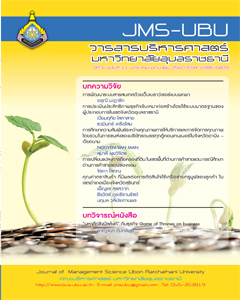การเปลี่ยนแปลงการถือครองที่ดินในเขตพื้นที่ด่านการค้าชายแดน กรณีศึกษาด่านการค้าชายแดนช่องจอม Land Ownership Changes in a Boarder Trade Area: A Case Study of Chong Jom Border Trade Market
Main Article Content
บทคัดย่อ
บทคัดย่อ
งานวิจัยนี้เป็นการศึกษาการเปลี่ยนแปลงการถือครองที่ดินในพื้นที่ชายแดนใกล้กับด่านการค้าชายแดนช่องจอม โดยมุ่งเน้นการศึกษาการเปลี่ยนแปลงการถือครองที่ดินตั้งแต่มีการสร้างความร่วมมือในกรอบ ACMEC หรือ ยุทธศาสตร์ความร่วมมือทางเศรษฐกิจ อิรวดี - เจ้าพระยา - แม่โขง (Ayeyawady - Chao Phraya - Mekong Economic Cooperation Strategy) ตั้งแต่ปี 2546 เป็นต้นมา ซึ่งผู้วิจัยมุ่งศึกษา 3 ประเด็นหลัก คือ 1) เพื่อศึกษาลักษณะการเปลี่ยนแปลงการถือครองที่ดิน 2) เพื่อศึกษาสาเหตุการเปลี่ยนแปลงการถือครองที่ดิน และ 3) เพื่อศึกษาผลกระทบจากการเปลี่ยนแปลงการถือครองที่ดิน ประชากรและกลุ่มตัวอย่าง ใช้การสุ่มตัวอย่างตามหลักความน่าจะเป็น (probably sampling) ซึ่งใช้วิธีสุ่มตัวอย่างแบบ การสุ่มตัวอย่างแบบง่าย (Simple Random Sampling) ได้แก่ ตัวแทนครัวเรือนจากบ้านด่านพัฒนา ต.ด่าน อ. กาบเชิง จ. สุรินทร์ จำนวนทั้งสิ้น 104 ครัวเรือน โดยสรุปผลการศึกษาได้ดังนี้
จากการศึกษาพบว่า ชาวบ้านในพื้นที่ศึกษามีการเปลี่ยนแปลงการถือครองที่ดินในอัตราที่สูง โดยพบว่าในช่วงระยะเวลาสิบปีที่ผ่านมา ชาวบ้านมีการเปลี่ยนแปลงการการถือครองที่ดิน จำนวน 59 ราย คิดเป็นร้อยละ 56.7 โดยพบว่าส่วนใหญ่มีการเปลี่ยนแปลงการถือครองที่ดินในลักษณะของการเป็นผู้เช่าที่ดินมากที่สุด รองลงมาได้แก่ ผู้ซื้อที่ดิน และผู้ให้เช่าที่ดิน ตามลำดับ สาเหตุจูงใจหลักที่ทำให้ชาวบ้านขาย/ให้เช่าที่ดินในพื้นที่สามอันดับแรก ได้แก่ ต้องการเงินเพื่อชำระหนี้สินหรือใช้จ่ายในครัวเรือน ขาดเงินลงทุนด้านการเกษตร และแรงจูงใจจากราคาที่ดินที่สูงขึ้นเนื่องจากกระแสความต้องการที่ดินในเขตพื้นที่ชายแดน ส่วนสาเหตุในการซื้อ/เช่าที่ดิน ได้แก่ การขยายตัวของตลาดการค้าชายแดน จึงน่าลงทุนซื้อ/เช่าที่เพื่อทำร้านค้า ห้องเช่า และร้านอาหาร ต้องการซื้อ/เช่าที่ดินเพื่อสร้างที่อยู่อาศัย และที่ดินราคาถูกกว่าตัวเมืองแต่มีแนวโน้มราคาสูงขึ้นเพราะอยู่ใกล้ตลาดการค้าชายแดน จึงต้องการซื้อที่ดินเพื่อเก็งกำไร ตามลำดับ
ส่วนการศึกษาผลกระทบจากการเปลี่ยนแปลงการถือครองที่ดินด้านบวกที่สำคัญ ได้แก่ การนำเงินที่ได้จากการขาย/ให้เช่าที่ดินมาปลดหนี้ทำให้เป็นหนี้ลดลง รวมทั้งการมีอาชีพเสริมนอกภาคเกษตรกรรม เช่น รับจ้าง และค้าขายมากยิ่งขึ้น อย่างไรก็ตามกลับพบว่าชาวบ้านส่วนใหญ่มีรายจ่ายและหนี้เพิ่มสูงมากขึ้น เนื่องจากใช้จ่ายเงินกับสิ่งอำนวยความสะดวกต่างๆภายในครัวเรือนมากยิ่งขึ้น รวมทั้งวิถีชีวิตที่เปลี่ยนไปทำให้ความเกื้อกูลกันและพึ่งพาอาศัยกันน้อยลง ความสัมพันธ์เป็นแบบต่างคนต่างอยู่มากยิ่งขึ้น นอกจากนี้ที่ดินเกษตรกรรมถูกใช้ในการสร้างโกดังเก็บสินค้าและห้องพักชั่วคราวแบบแออัดสำหรับพ่อค้าชาวกัมพูชา ทำให้บริเวณดังกล่าวกลายเป็นแหล่งทัศนียภาพเสื่อมโทรม อีกทั้งการเปลี่ยนแปลงการถือครองที่ดินซึ่งทำให้ตลาดการค้าชายแดนขยายตัว ส่งผลให้เกิดมลพิษทางอากาศจากการเผาขยะรวมทั้งปัญหาน้ำทิ้งจากตลาดที่ไหลลงคลองในหมู่บ้านทำให้เกิดปัญหาน้ำเสียและส่งกลิ่นเหม็น
Abstract
This research studied changes in land ownership in an area nearby Chong Jom, border trade market. The research focused on the timeline after the economic cooperation framework of the "Ayeyawady-Chao Phraya-Mekong Economic Cooperation Strategy" or "ACMECS" in 2003. The research attempted to study main three key issues: characteristics of the land ownership change, causes of the land ownership change and impacts of the land ownership change. Sampling size (using Simple Random Sampling) was 104 representative households from Ban Dan Pattana Village, Dan sub-district, Kab Cheng district, Surin Province. The following is a summary of the results.
The study showed that 59 household (56.7%) had land ownership changes. Most of them were leasing, buying and renting respectively. The important causes of land ownership selling/renting their land were the poverty and debt of the land owners, changing occupation, lack of agricultural investment, and fund requirement for border trade investment respectively. Causes of buying/leasing the land, were land requirement for commercial investment owing to an expansion of the border trade market, land requirement for housing, and low price of land comparing to land in urban areas.
Significantly positive impacts resulting from the change in land ownership were rapid income for household expense and paying off their debts, and changes in occupation from agriculture to self-employment and commerce. However, negative impacts found in the study area were more household expense and even new debt because of the materialistic values, and changes in occupation values and lifestyle which caused changes in social relationship of the local people. In addition, agricultural land was turned to slum areas for warehouse and housing for Cambodian merchants. Further, land changes resulted in an expansion of the border trade market. The study found that it generated air pollution from garbage burning and waste to the local water resource.
Downloads
Article Details
บทความที่ตีพิมพ์ในวารสารบริหารศาสตร์ มหาวิทยาลัยอุบลราชธานี เป็นลิขสิทธิ์ของวารสาร โดยเนื้อหาและความคิดเห็นในบทความเป็นความรับผิดชอบของผู้เขียนแต่ละท่าน ไม่เกี่ยวข้องกับคณะบริหารศาสตร์ มหาวิทยาลัยอุบลราชธานีแต่อย่างใด และหากมีข้อผิดพลาดประการใด ผู้เขียนจะเป็นผู้รับผิดชอบต่อบทความของตนเองแต่เพียงผู้เดียว

